介词的用法与练习
- 格式:doc
- 大小:52.50 KB
- 文档页数:6
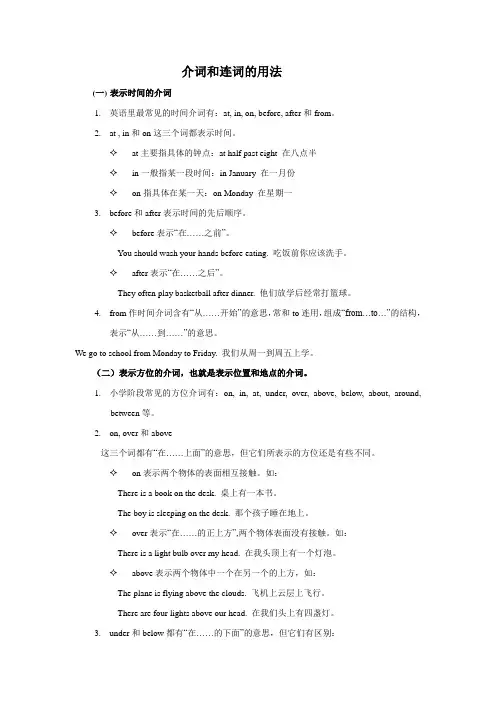
介词和连词的用法(一)表示时间的介词1.英语里最常见的时间介词有:at, in, on, before, after和from。
2.at , in和on这三个词都表示时间。
✧at主要指具体的钟点:at half past eight 在八点半✧in一般指某一段时间:in January 在一月份✧on指具体在某一天:on Monday 在星期一3.before和after表示时间的先后顺序。
✧before表示“在……之前”。
You should wash your hands before eating. 吃饭前你应该洗手。
✧after表示“在……之后”。
They often play basketball after dinner. 他们放学后经常打篮球。
4.from作时间介词含有“从……开始”的意思,常和to连用,组成“from…to…”的结构,表示“从……到……”的意思。
We go to school from Monday to Friday. 我们从周一到周五上学。
(二)表示方位的介词,也就是表示位置和地点的介词。
1.小学阶段常见的方位介词有:on, in, at, under, over, above, below, about, around,between等。
2.on, over和above这三个词都有“在……上面”的意思,但它们所表示的方位还是有些不同。
✧on表示两个物体的表面相互接触。
如:There is a book on the desk. 桌上有一本书。
The boy is sleeping on the desk. 那个孩子睡在地上。
✧over表示“在……的正上方”,两个物体表面没有接触。
如:There is a light bulb over my head. 在我头顶上有一个灯泡。
✧above表示两个物体中一个在另一个的上方,如:The plane is flying above the clouds. 飞机上云层上飞行。
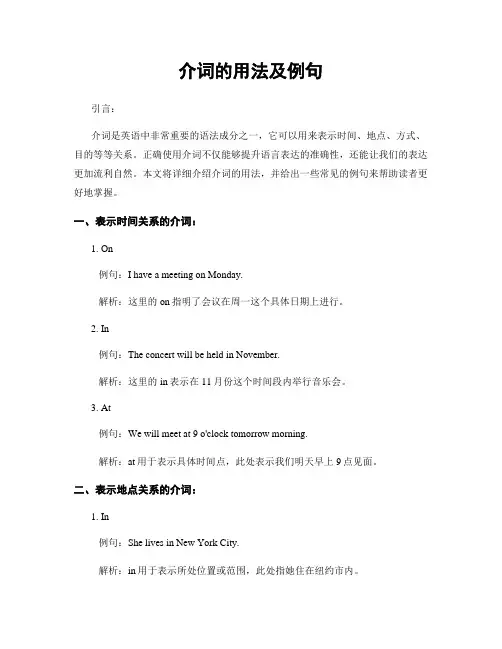
介词的用法及例句引言:介词是英语中非常重要的语法成分之一,它可以用来表示时间、地点、方式、目的等等关系。
正确使用介词不仅能够提升语言表达的准确性,还能让我们的表达更加流利自然。
本文将详细介绍介词的用法,并给出一些常见的例句来帮助读者更好地掌握。
一、表示时间关系的介词:1. On例句:I have a meeting on Monday.解析:这里的on指明了会议在周一这个具体日期上进行。
2. In例句:The concert will be held in November.解析:这里的in表示在11月份这个时间段内举行音乐会。
3. At例句:We will meet at 9 o'clock tomorrow morning.解析:at用于表示具体时间点,此处表示我们明天早上9点见面。
二、表示地点关系的介词:1. In例句:She lives in New York City.解析:in用于表示所处位置或范围,此处指她住在纽约市内。
例句:I will meet you at the coffee shop.解析:at表示在某个特定地方遇见某人,这里指我将在咖啡店见你。
3. On例句:The book is on the table.解析:on表示在某物的表面,这里指书本放在桌子上。
三、表示方式关系的介词:1. By例句:She goes to work by bus.解析:by表示通过某种交通工具或方式进行,这里指她乘公交车上班。
2. With例句:He cuts the meat with a knife.解析:with表示使用某物进行操作,这里指他用刀切肉。
3. Like例句:He speaks English like a native speaker.解析:like表示像某人或某事物一样,这里指他说英语像个母语者一样流利。
四、表示目的关系的介词:1. For例句:I bought some flowers for my mother.解析:for表示为了某人或某事物而做,这里我买花是为了给妈妈。
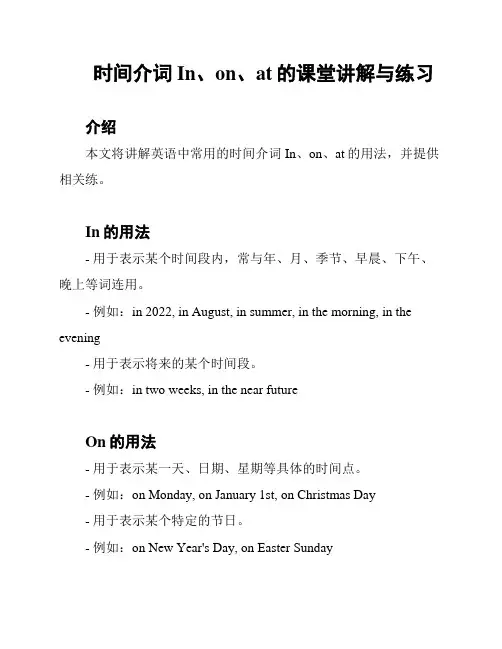
时间介词In、on、at的课堂讲解与练习介绍本文将讲解英语中常用的时间介词In、on、at的用法,并提供相关练。
In的用法- 用于表示某个时间段内,常与年、月、季节、早晨、下午、晚上等词连用。
- 例如:in 2022, in August, in summer, in the morning, in the evening- 用于表示将来的某个时间段。
- 例如:in two weeks, in the near futureOn的用法- 用于表示某一天、日期、星期等具体的时间点。
- 例如:on Monday, on January 1st, on Christmas Day- 用于表示某个特定的节日。
- 例如:on New Year's Day, on Easter SundayAt的用法- 用于表示具体的时刻。
- 例如:at 8 o'clock, at noon, at midnight- 用于表示某个特定的时间点。
- 例如:at sunrise, at sunset练请根据上述介绍,填入适当的时间介词。
1. I will meet you at the park on Sunday.at the park on Sunday.2. The party will be held in the evening on New Year's Eve.in the evening on New Year's Eve.3. She was born in September at 10 o'clock in the morning.in September at 10 o'clock in the morning.4. We usually go skiing in winter at the weekend.in winter at the weekend.5. The concert will start at 8:30 PM on Friday.at 8:30 PM on Friday.总结通过研究In、on、at的用法,我们可以更准确地表达时间。
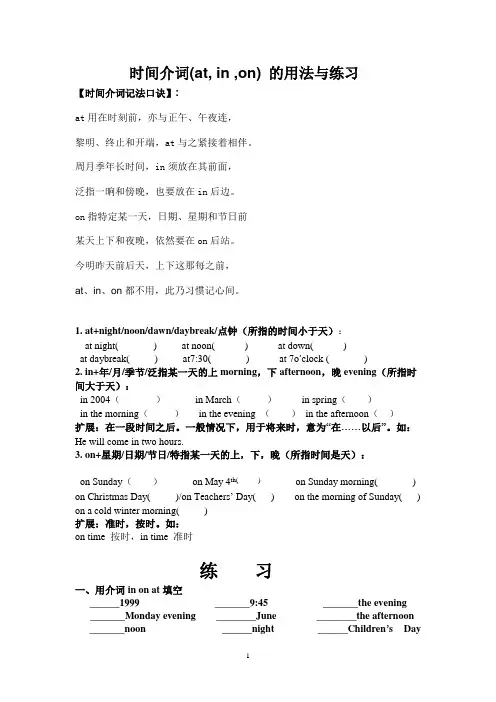
时间介词(at, in ,on) 的用法与练习【时间介词记法口诀】:at用在时刻前,亦与正午、午夜连,黎明、终止和开端,at与之紧接着相伴。
周月季年长时间,in须放在其前面,泛指一晌和傍晚,也要放在in后边。
on指特定某一天,日期、星期和节日前某天上下和夜晚,依然要在on后站。
今明昨天前后天,上下这那每之前,at、in、on都不用,此乃习惯记心间。
1. at+night/noon/dawn/daybreak/点钟(所指的时间小于天):at night( ) at noon( ) at down( )at daybreak( ) at7:30( ) at 7o’clock ( )2. in+年/月/季节/泛指某一天的上morning,下afternoon,晚evening(所指时间大于天):in 2004()in March()in spring()in the morning()in the evening ()in the afternoon()扩展:在一段时间之后。
一般情况下,用于将来时,意为“在……以后”。
如:He will come in two hours.3. on+星期/日期/节日/特指某一天的上,下,晚(所指时间是天):on Sunday()on May 4th( )on Sunday morning( ) on Christmas Day( )/on Teachers’ Day( ) on the morning of Sunday( ) on a cold winter morning( )扩展:准时,按时。
如:on time 按时,in time 准时练习一、用介词in on at填空______1999 _______9:45 _______the evening _______Monday evening ________June ________the afternoon _______noon ______night ______Children’s Day______Teachers’Day _______8 o’clock _______Summer_______May ______May,1999 ________May15th,1999 二、单选( ) 1. Children get gifts ____ Christmas(圣诞节) and ____ their birthdays.A. on; onB. at; onC. in; inD. in; on( ) 2.----There is nothing ____tomorrow afternoon, is there? -----No. We can have a game of table tennis.A. onB. inC. outD. up( ) 3. A lot of students in our school were born____March, 1981.A. inB. atC. onD. since( ) 4. He suddenly returned____ a rainy night.A. onB. atC. inD. during( ) 5. My grandfather was born____Oct. 10, 1935.A. onB. inC. atD. of( ) 6. The train is starting___five minutes.A. inB. atC. forD.still( ) 7. Mike does his exercises ____ seven _____ the evening.A. on; toB. at; inC. by; ofD. at; on( ) 8. Children wake up very early____the morning of Christmas Day.A. inB. onC. forD. at( ) 9 ____ a cold winter morning, I met her in the stfeet.A. InB. OnC. AtD. For( ) 10 It happened to be very cold____ the morning of our sports meeting.A. atB. onC. withD. of( ) 11. Why did you get up so early ___ this morning.A. onB. /C. atD. in( ) 12. He went to Shanghai___ September 3, 1991 and came back___ a cold morning last year.A. in; onB. on; inC. on; onD. in; ia( ) 13. Lucy was born____ the night of May 12, 1984. . ...A. onB. inC. atD. to( ) 14. Mrs Brown came to China ____ 1996.A.onB. ofC. to,D. in( ) 15 ___ the morning of November 20, 1915, the workers came to Chicago to show their mourning of Joe Hill.A. OnB. InC. OnD. At( ) 16. Ann moved___Hangzhou___September, 1992.A. /; inB. to; inC. to; on D, in; in( ) 17. They started off___an autumn afternoon.A. duringB. atC. inD. on( ) 18. He often goes ____ school ____ six thirty ____ the morning.A. for; to; inB. to; at; inC. to; for; at D, for; at; to( ) 19. He arrived ___ Shanghai ___ 9: 30 ___ March 5. A. at; in; at B. to; on; at C. in; on; at D. in; at; on( ) 20.The English teacher told me to get there____ half past ten.A: in B. at C. on D. of基数词与序数词专项练习一、知识归纳①基数词变序数词的规律:口诀:基变序,有规律,结尾加上th。
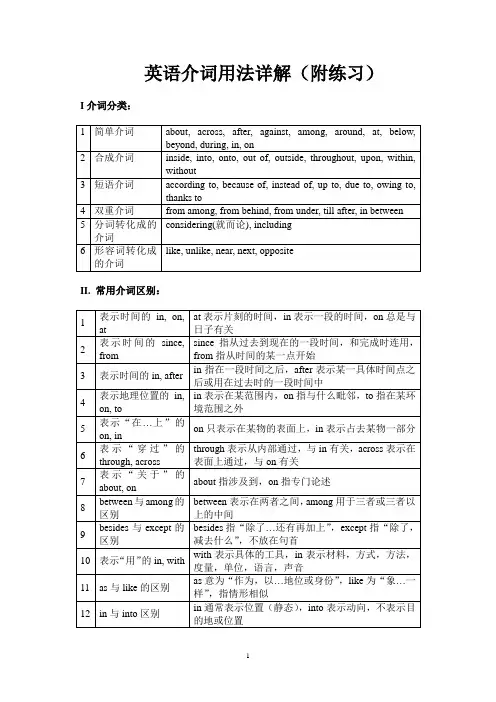
英语介词用法详解(附练习)I介词分类:II. 常用介词区别:介词的句法功能:介词不能独立在句中做成份,介词后必须与名词、代词、或动名词构成介词短语在句中充当一个成份,表示人、物、事件等与其它人、物、事件等之间的关系。
1、作定语:The book on the table is mine.2、作状语:We have breakfast at seven.(表时间);They were late for meeting because of the heavy rain.(表原因);They started the machine by pressing the button.(表方法)3、作表语:My dictionary is in the bag.4、作宾语补足语:I found him in the office.(二)主要介词区别1、表示时间的at, in, on:at表示片刻的时间,如:at 8 o’clock ,常用词组有:at noon, at night, at midnight, at the end of, at that time, at the beginning of, at the age of, at Christmas, at New Year等。
in表示一段的时间,如:in the morning, in the afternoon, in the evening, in October, in 1998, in summer, in the past, in the future等。
on总是跟日子有关,on Monday, on Christmas morning, on the following, on May Day, on a warm morning等。
2、表示时间的since和from:since表示从过去到现在的一段时间的过程,常与现在完成时连用。
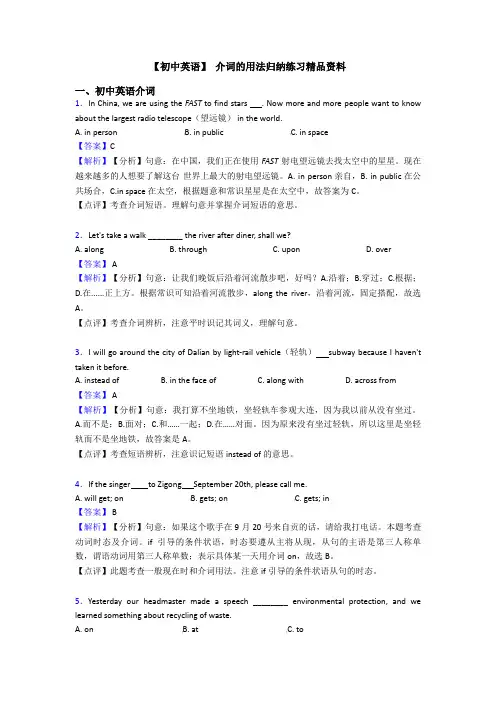
【初中英语】介词的用法归纳练习精品资料一、初中英语介词1.In China, we are using the FAST to find stars . Now more and more people want to know about the largest radio telescope(望远镜) in the world.A. in personB. in publicC. in space【答案】C【解析】【分析】句意:在中国,我们正在使用FAST 射电望远镜去找太空中的星星。
现在越来越多的人想要了解这台世界上最大的射电望远镜。
A. in person亲自,B. in public在公共场合,C.in space 在太空,根据题意和常识星星是在太空中,故答案为C。
【点评】考查介词短语。
理解句意并掌握介词短语的意思。
2.Let's take a walk ________ the river after diner, shall we?A. alongB. throughC. uponD. over【答案】 A【解析】【分析】句意:让我们晚饭后沿着河流散步吧,好吗?A.沿着;B.穿过;C.根据;D.在......正上方。
根据常识可知沿着河流散步,along the river,沿着河流,固定搭配,故选A。
【点评】考查介词辨析,注意平时识记其词义,理解句意。
3.I will go around the city of Dalian by light-rail vehicle(轻轨) subway because I haven't taken it before.A. instead ofB. in the face ofC. along withD. across from【答案】 A【解析】【分析】句意:我打算不坐地铁,坐轻轨车参观大连,因为我以前从没有坐过。
A.而不是;B.面对;C.和……一起;D.在……对面。
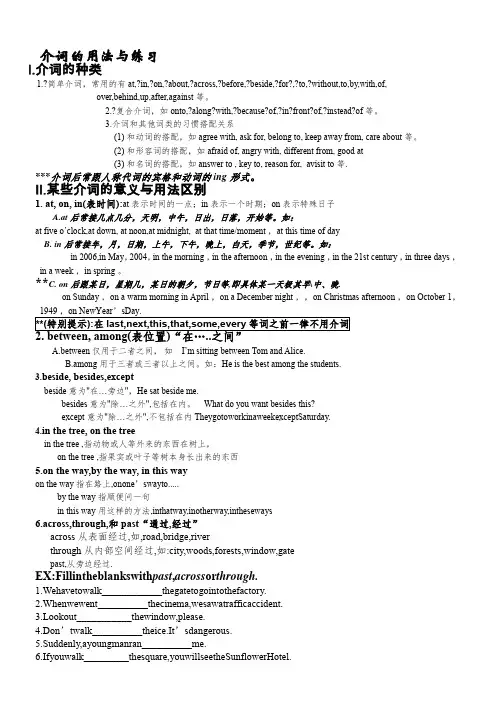
介词的用法与练习I.介词的种类1.?简单介词,常用的有at,?in,?on,?about,?across,?before,?beside,?for?,?to,?without,to,by,with,of,over,behind,up,after,against等。
2.?复合介词,如onto,?along?with,?because?of,?in?front?of,?instead?of等。
3.介词和其他词类的习惯搭配关系(1) 和动词的搭配,如agree with, ask for, belong to, keep away from, care about等。
(2) 和形容词的搭配,如afraid of, angry with, different from, good at(3) 和名词的搭配,如answer to , key to, reason for, avisit to等.***介词后常跟人称代词的宾格和动词的ing形式。
,,in this way 用这样的方法,inthatway,inotherway,intheseways6.across,through,和past“通过,经过”across从表面经过,如,road,bridge,riverthrough从内部空间经过,如:city,woods,forests,window,gatepast,从旁边经过.EX:Fillintheblankswith past,across or through.1.Wehavetowalk____________thegatetogointothefactory.2.Whenwewent__________thecinema,wesawatrafficaccident.3.Lookout___________thewindow,please.4.Don’twalk__________theice.It’sdangerous.5.Suddenly,ayoungmanran__________me.6.Ifyouwalk_________thesquare,youwillseetheSunflowerHotel.7.Therivergoes______________thecity.8.Theoldmancanswim__________thestream.9.Iwalked_________himwithoutsayinghello.10.Thearmymoved_____________theforestsquietly.7.for,since,A.since仅说明什么时候开始,,后常跟一个具体的过去的时间.B.for表示某动作或情况持续多久,后常跟一段时间。
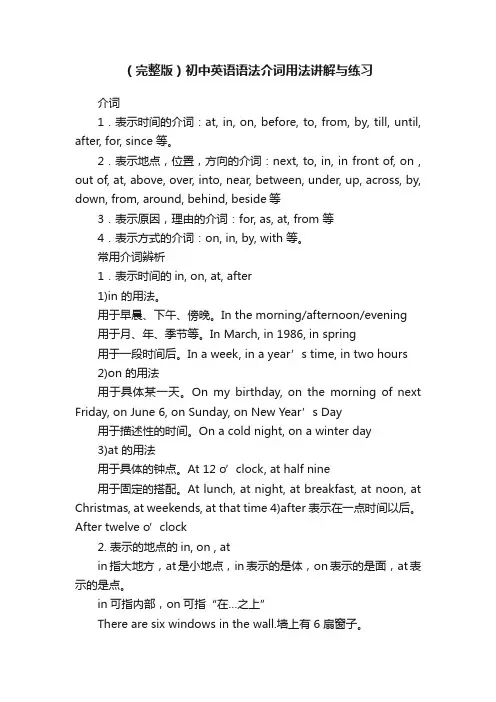
(完整版)初中英语语法介词用法讲解与练习介词1.表示时间的介词:at, in, on, before, to, from, by, till, until, after, for, since 等。
2.表示地点,位置,方向的介词:next, to, in, in front of, on , out of, at, above, over, into, near, between, under, up, across, by, down, from, around, behind, beside等3.表示原因,理由的介词:for, as, at, from 等4.表示方式的介词:on, in, by, with 等。
常用介词辨析1.表示时间的in, on, at, after1)in 的用法。
用于早晨、下午、傍晚。
In the morning/afternoon/evening用于月、年、季节等。
In March, in 1986, in spring用于一段时间后。
In a week, in a year’s time, in two hours2)on 的用法用于具体某一天。
On my birthday, on the morning of next Friday, on June 6, on Sunday, on New Year’s Day用于描述性的时间。
On a cold night, on a winter day3)at 的用法用于具体的钟点。
At 12 o’clock, at half nine用于固定的搭配。
At lunch, at night, at breakfast, at noon, at Christmas, at weekends, at that time 4)after 表示在一点时间以后。
After twelve o’clock2. 表示的地点的in, on , atin指大地方,at是小地点,in表示的是体,on表示的是面,at表示的是点。


介词的基本用法介词是英语中一类常见的词汇,用于表示各种关系和位置。
在句子中,介词通常用来连接名词或代词,与其他词语形成短语,进一步表达句子的意思。
在本文中,我们将介绍介词的基本用法,并提供一些例子来加深理解。
1. 表示位置关系介词在英语中常被用来描述位置关系,包括在、上、下、旁边等。
以下是一些常见的表示位置关系的介词及其用法:- 在(on):表示某物在另一物体的表面或面上。
例如:The book is on the table.- 下(under):表示某物在另一物体下面。
例如:The cat is under the bed.- 在(in):表示某物在另一物体内部。
例如:The pencil is in the drawer.- 旁边(beside):表示某物在另一物体的旁边。
例如:The park is beside the supermarket.2. 表示时间关系介词也可用来表示时间关系,包括在、在...前、在...后等。
以下是一些常见的表示时间关系的介词及其用法:- 在(at):表示某一时间点。
例如:I'll meet you at 9 o'clock.- 在...前(before):表示在某一具体时间之前。
例如:Please finish your homework before dinner.- 在...后(after):表示在某一具体时间之后。
例如:I'll call you after I finish work.- 从...到...(from...to):表示一个时间范围。
例如:The shop isopen from Monday to Saturday.3. 表示方式、原因和目的介词还用于表示方式、原因和目的等。
以下是一些常见的表示方式、原因和目的的介词及其用法:- 通过(by):表示某种方式或方法。
例如:I go to work by bus.- 对于(for):表示某事情的目的或原因。
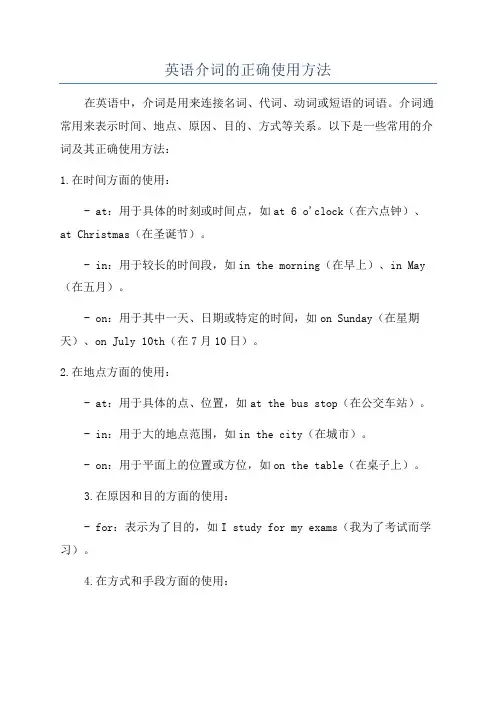
英语介词的正确使用方法
在英语中,介词是用来连接名词、代词、动词或短语的词语。
介词通常用来表示时间、地点、原因、目的、方式等关系。
以下是一些常用的介词及其正确使用方法:
1.在时间方面的使用:
- at:用于具体的时刻或时间点,如at 6 o'clock(在六点钟)、at Christmas(在圣诞节)。
- in:用于较长的时间段,如in the morning(在早上)、in May (在五月)。
- on:用于其中一天、日期或特定的时间,如on Sunday(在星期天)、on July 10th(在7月10日)。
2.在地点方面的使用:
- at:用于具体的点、位置,如at the bus stop(在公交车站)。
- in:用于大的地点范围,如in the city(在城市)。
- on:用于平面上的位置或方位,如on the table(在桌子上)。
3.在原因和目的方面的使用:
- for:表示为了目的,如I study for my exams(我为了考试而学习)。
4.在方式和手段方面的使用:
- by:表示通过其中一种方式或手段,如by car(乘坐汽车)、by email(通过电子邮件)。
- with:表示使用物或与人一起做事,如write with a pen(用钢笔写)、go with a friend(和朋友一起去)。
此外,有些介词在特定短语中使用时有固定的搭配,需根据具体语境学习和掌握。
最好的方法是在阅读和听力中积累和理解介词的正确用法,并在实际语言交流中多加练习和应用。
介词一、介词概述1、介词的定义:介词是一种虚词,用来表示名词或相当于名词的其它词语在句中与其它词的关系,不能单独使用。
介词可与名词或相当于名词的其它词构成介词短语。
介词短语可在句中作定语,状语,表语和宾语补足语。
2、介词的分类:时间介词、地点介词、方式介词、原因介词等。
3. 介词短语的句法作用介词短语作为一个成分在句中可用作定语、状语、表语、宾语补足语等。
(1)作定语介词短语作定语时,一般放在被修饰词的后面,作后置定语。
The book on the desk is very interesting.书桌上的那本书很有趣。
China is a great country with a long history.中国是一个具有悠久历史的国家。
(2)作状语介词短语作状语时,一般放在动词后面或句末、句首。
用来表示时间、地点、目的、方式和原因等。
The basketball match will start at nine.篮球比赛将在9点开始。
(表示时间)He likes to swim in the river.他喜欢去河里游泳。
(表示地点)I went there to get my book back.我去那里取回我的书。
(表示目的)I came here by bike.我骑自行车来到这里。
(表示方式)She was trembling with fear.她吓得直发抖。
(表示原因)(3)作表语介词短语作表语时,一般放在be动词和连系动词之后。
I’m on duty today.今天我值日。
My English teacher is from Australia.我的英语老师来自澳大利亚。
(4)作宾语补足语介词短语作宾语补足语时,一般放在宾语之后。
I found everything in good condition.我发现一切状况良好。
When he woke up, he found himself in the hospital.当他醒来时,他发现自己在医院里。
英语基础语法·介词1. 介词的定义介词是一种用来表示词与词, 或者词与句之间的关系的词,在句中不能单独作句成分.介词一定要有宾语,充当宾语的一般有名词、代词或相当于名词的其它词、短语或句子,短语或从句.2. 介词的种类<1>简单介词,如at, in off, on, by, to, with等.<2>合成介词,如into, inside, within, throughout等.<3>短语介词,如according to, because of, in addition to, in front of, in spite of等.<4>二重介词,如from behind, from among, until after, at about等.3. 介词的宾语<1>名词:Let’s go for a walk along the river. 咱们到江边散散步.<2>代词:He’s standing in front of me. 我站在我前面.<3>形容词:Her pronunciation is far from perfect. 她的语音远不是完美的.注:有的形容词前可看作是省略了being.<4>动名词:He’s good at drawing.他善长绘画.<5>过去分词:I took it for granted that she was for England.我还以为她是英国的.注:过去分词作介词宾语只限于take…for granted 结构和用于regard…as后.<6>不定式:I had no choice but to lie down. 除了躺下外我别无选择.She did nothing but cry.她只是哭.注:介词后通常是不能用不定式作宾语的,只有表示"除……外〞的but, except 等个别介词能接不定式作宾语.前面有行为动词do时,不定式不用to,否则要带to.<7>疑问词+不定式:I don’t know how to improve my English.我不知道如何提高我的英语水平.<8>副词:I didn’t know it until recently. 直到最近我才知道此事.<9>数词:He was among the first to arrive. 他是第一批到的.<10>介词短语:She won’t go home until after the exam. 她要考完试之后再回家.<11>从句:Think of what I said. 想想我说的话<from yygrammar >.I’m worried about where he is. 我担心他上哪儿去了.I have doubts about whether<不用if> he is the best man for the job. 我怀疑他是否做这项工作的最好人选.He has no special fault except that he smokes too much.他除了抽烟太多之外,没有什么特别的毛病.注:除except that, in that等后可接that从句外,通常只接连接代词、连接副词与whether引导的从句,也不接if引导的从句.4. 介词短语的作用介词和它的宾语构成介词词组,其用法如下:<1>作定语:The girl in red is my sister. 穿红衣的那个女孩是我妹妹.注:介词短语作定语总是放在它所修饰的名词后面.<2>作状语:Can you say it in English? 这个你会用英语说吗?<3>作表语:He’s in the office. 他在办公室.<4>作补语:I always find her at her studies. 我经常发现她在学习.<5>作介词宾语:I saw her from across the street. 我从街对面望见了她.英语常用介词用法与辨析■表示方位的介词:in, to, on1. in 表示在某地X围之内.如:Shanghai is/lies in the east of China. ##在中国的东部.2. to 表示在某地X围之外.如:Japan is/lies to the east of China. 日本位于中国的东面.3. on 表示与某地相邻或接壤.如:Mongolia is/lies on the north of China. 蒙古国位于中国北边.■表示计量的介词:at, for, by1. at表示"以……速度〞"以……价格〞.如:It flies at about 900 kilometers a hour. 它以每小时900公里的速度飞行.I sold my car at a high price. 我以高价出售了我的汽车.2. for表示"用……交换,以……为代价〞.如:He sold his car for 500 dollars. 他以五百元把车卖了.注意:at表示单价<price> ,for表示总钱数.3. by表示"以……计〞,后跟度量单位.如:They paid him by the month. 他们按月给他计酬.Here eggs are sold by weight. 在这里鸡蛋是按重量卖的.■表示材料的介词:of, from, in1. of成品仍可看出原料.如:This box is made of paper. 这个盒子是纸做的.2. from成品已看不出原料.如:Wine is made from grapes. 葡萄酒是葡萄酿成的.3. in表示用某种材料或语言.如:Please fill in the form in pencil first. 请先用铅笔填写这个表格.They talk in English. 他们用英语交谈<from yygrammar >.注意:in指用材料,不用冠词;而with指用工具,要用冠词.请比较:draw in pencil/draw with a pencil.■表示工具或手段的介词:by, with, on1. by用某种方式,多用于交通.如by bus乘公共汽车,by e-mail. 通过电子.注意:表示搭乘交通工具时,用by时不用冠词,用in时要用冠词.请比较:I went there by bus/in a bus. 我是坐公共汽车去的那儿.2. with表示"用某种工具〞.如:He broke the window with a stone. 他用石头把玻璃砸坏了.注意:with表示用某种工具时,必须用冠词或物主代词.3. on表示"以……方式〞,多用于固定词组.They talked on the telephone. 他们通过进行交谈.She learns English on the radio/on TV. 她通过收音机/电视学英语.■表示关于的介词:of, about, on1. of仅是提到或谈到过某人或某事.如:He spoke of the film the other day. 他前几天提到了这部影片.He thought about this matter yesterday. 他昨天考虑了这件事.2. about指"关于〞某人或某事物的较详细的情况.如:Can you tell me something about yourself? 你能告诉我一些关于你自己的事情吗?3. on指"关于〞学术性的或严肃的事.如:It’s a textbook on the history of china. 它是一本有关中国历史的教科书.■表原因或理由的介词:for, at, from, of, with, by, because of1. for表示原因,常与sorry, famous, punish, praise, thank, blame等词连用.如:I am sorry for what I said to you. 我后悔不该对你讲那些话.2. at指情感变化的原因,意为"因听到或看到而……〞.如:He was surprised at the news. 听到这消息他大吃一惊.3. from指"外在的原因〞,如受伤、车祸等.如:He died from the wound. 他因受伤而致死.4. of指"内在的原因〞,如病、饿等.如:The old man died of hunger. 老人死于饥饿.5. with指生理上或情感上的由外界到内心的原因.如:Hearing the news, he jumped with joy. 他们听到这个消息,欣喜若狂.He was shaking with anger. 他气得浑身发抖.6. by表示外部的,尤其是暴力的或无意中造成某种结果的原因.Her body was bent by age. 他因年老背弯了.She took your umbrella by mistake. 我因弄错拿了你的雨伞.7. because of 表示引起结果的直接原因.如:He retired last month because of illness/because he ill.8. owing to多表示引起某不良后果的原因.如:Owing to the rain they could not come. 由于下雨他们没来.9. thanks to表示引起某种幸运结果的原因,常译为"幸亏……,多亏……〞.如:Thanks to John, we won the game. 多亏约翰,我们才赢了这场比赛.10. out of表示动机的起因,常译为"出于……〞.如:He asked the question out of curiosity. 他出于好奇才问了那个问题.11. through多表示因局部而影响全局的原因.如:The war was lost through bad organization. 战争因组织不周而失败了.■表示好像或当作的介词:like, as1. like表示"像……一样〞,其实不是.如:Peter the Great, like his country, was strong and proud. 彼得大帝像他的国家一样强健和自豪.2. as表示"作为,以……身份〞,其实也是.如:He talked to me as a father. 他以父亲的身份跟我谈话.注:as作连词时,可表示"好像……〞.如:The work is not so difficult as you imagin这工作不像你想像的那么困难.■表示支持或反对的介词:against, foragainst反对,for支持,互为反义词.如:Are you for my idea or against it? 你赞同还是反对我的想法?■表示除某人某物外的介词:besides, except1. besides是包括后面所提人或物在内的"除……外,还〞.如:Thirty students went to the cinema besides him. 除他以外,还有30个学生去看了电影.<他和另外30人都去了>He is interested in tennis besides〔=as well as〕football. 除了足球,他还对网球感兴趣.2. except是指不包括后面所提人或物在内的"除去〞.如<from yygrammar >:Everyone is excited except me. 除我以外的每个人都很激动.〔他们激动,而我却不激动〕All the visitors are Japanese except him. 除他以外的所有游客都是日本人.〔其他人是日本人,可他不是〕注意:<A> except通常与表示全体的all, every连用;若与other连用,只能用besides.如:He had other people to take care of besides me. 除我之外,他还要照顾别人.<B> except是排除同类;而except for是排除非同类,常在说明基本情况后,从细节上加上修正.如:The composition is very good except for a few spelling mistakes. 除了几处拼写错误之外,这篇作文整体还是不错的.<作文与拼写错误是非同类的>但except for也可代替except,特别是在句首时,因为except是不能用于句首的.如:Except George, you can all go. 除乔治外,你们都可以去.■表示时间的介词:1.at, on, in<1> at表示"在某一时刻、某一时间点〞at 5:30在5:30 at sunrise 日出时at lunch 午饭时at noon正午时at night 夜间I get up at 6:00 every day. 我每天6:00起床.表示"在……岁〞时用at the age of….如:at the age of five 在五岁时<2> on表示"在具体某一天或某天的上、下午〞.如:on Monday在星期一on April 1st在四月一日I heard a shot on the morning of March 18.三月十八日早晨我听到一声枪响.泛指上、下午、晚上、夜间时用in the morning/afternoon/evening, at night;但若指具体某一天的上述时段时,则一律用on.如:on the afternoon of May 23 在五月二十三日下午<3> in表示"在某月、季节、年、世纪〞以与泛指的上、下午、晚上.in September在九月in winter在冬季in 1999 在1999年in the 20th century在20世纪in the morning/afternoon/evening 在上午/下午/晚上2.for, during, through<1> for表示"一段时间〞,后接与数词连用的时间名词.多与完成时连用.I’ve been a soldier for 5 years.我入伍已5年了.She has been ill for several days. 她已经病了几天了.表示"持续一段时间〞时,for后面必须跟"数字+时间名词〞,而during后决不可接数字.<2> during表示"在……期间〞He visited many nice places during his stay here.在他逗留期间他参观了许多美丽的地方. What did you do during the summer vacation? 你在暑假做了什么?<3> through表示"一直……,自始至终〞They worked hard through the winter.整个冬天他们都在努力工作.She treated me like her brother through these years. 这些年来她始终把我当哥哥对待. 3.from, since<1> from 作"从……〞解,多用于"from…to/till…〞中.You can come anytime from Monday to Friday. 周一至周五你什么时间来都行.The exam will start from 9:00am. 考试将从上午九点开始.①from"从……〔开始〕〞未必持续到现在,如:from 1995 to 1998.从1995年到1998年.而since是指"自从……以来一直持续到现在〞②since一般只与现在完成时连用,而from不受此限.<2> since表示"自从……以来〔直到现在〕〞He has been away from home since 1973.他自从1973年就离开了家乡.We have known each other since ten years ago.我们十年前就认识了.for与since表示一段时间,但for与时间段连用,而since与时间点连用.如for two hours〔持续〕两小时;since last week自从上周直到现在4.before, by, till, until<1> before指"在……之前〞Please come before ten o’clock.请10点以前来.The meeting will end after 3:00 p.m.会议将在下午三点后结束.表示"在……以前〞时,before与by基本可通用.但by还有"截至……为止〞之意,此时可与完成时连用,而before一般不与完成时连用.如:How many models have you made by the end of last month?截至上月底你做了多少个模型?<2> by指"不迟于,到……时为止,在……以前〞I must finish my homework by lunch.午饭前我必须做完作业.We had learned over 1000 words by the end of last term.到上学期末为止,我们已经学了1000多个单词了.<3> tell <until> "直到……为止〞You must wait for him till tomorrow.你必须一直等他到明天.He didn’t come back until twelve o’clock last night.他昨晚到12点才回来.在肯定句中,till <until>必须与延续动词连用.若与点动词连用,till <until>只能用于否定句中. 5.after, in, within①after表示"在……之后〞,是before的反义词.We’ll hold a party after dinner.晚餐后我们将举办晚会.He got a cancer and died after a year.他患了癌症,一年后去世了.I’ll phone you after I arrive.到达后我给你打.〔after作连词〕②within"在……时间之内〞I can finish it within an hour.我不需一小时就可把它做完.③in"在……时间之后〞I’ll arrive in an hour.我一小时后到达.比较after与in①after后可跟时间段,也可跟时间点,如after school〔放学后〕,而in后必须跟一段时间,如in an hour〔一小时后〕.②after既可用于将来时,也可用于过去时,而in只能用于将来时.③after既可作介词,又可作连词,而in只能作介词in与within后都必须跟时间段.表示"地点、方向〞的介词:1.in,outside,between, among①in表示"在……里面〞,如:What’s in the box? 盒子里是什么?She put her book in the desk. 她把书放进了书桌.②outside指"在……外面〞There are many people outside the room.房间外有很多人.What did your see outside the hall? 你在大厅外看见了什么?③between在……之间〔指二者〕There is a hospital between the hotel and the post office.在宾馆与邮局之间有所医院.The building stands between the park and the small river. 那栋建筑位于公园和小河之间. between是指"在两者之间〞,而among指"在多个之间〞.④among在……之间〔指三者以上〕"There is a thief among you.〞The policeman shouted to the crowd.警察向人群喊道:"你们中间有个小偷!〞He found his place among the crowd. 他在人群中找到了他的位置.2.on, above, over, below, under<1> on在……上面,表面相互接触.There is an apple on the table. 桌上有一个苹果.On the top of the hill, there is a flag. 山顶有一面旗子.<2> above只表示"在……上方或位置高出……〞,与below相对.A plane flew above our heads.一架飞机从我们头上飞过.The Turners live above us. 特纳一家人住在我们的上面.<3> over"在……正上方〞,与under相对.There is a bridge over the river.河上有一座桥.The picture is hanging over the blackboard. 那X图挂在黑板的正上方.<4> below在……下方,低于……There are many flowers below the window.窗下有很多花.Her skirt reaches just below her knees.她的裙子刚到膝盖下.<5> under在……正下方They sat under a big tree, drinking.他们坐在一棵大树下喝酒.What are you wearing under your coat? 你外套里面穿了什么?3.near, by, beside<1> near在……附近,与far相对A hospital was built near the railway station.在火车站附近建了一所医院. My home is near the school. 我的家离学校很近.<2> by = beside,靠近,在……旁边,比near距离更近He just sat by/ beside me in the cinema.在电影院他就坐在我旁边.He lay down beside the statuary. 他在雕像旁躺下了.4.in front of, behind, around<1> in front of在……前面A river flows in front of the house.房子前有一条河They put a bunch of flowers in front of the door. 他们在门前放了一束花. in the front of表示"在……前部〞,指里面.There is a red chair in the front of the room.在房间前半部有把红椅子.<2> behind在……后面A high building stands behind the village.村子后面有一高层建筑.The cat lies behind the door. 猫躺在门后面.<3> around在……周围,围绕There are many trees around the village.村子周围有很多树围绕.There are flowers around the stage. 舞台周围摆着鲜花.5.from, to, for, into, out of<1> from从……The train started from Paris.火车发自巴黎.She will fly from Beijing to Hong Kong. 她将从飞往##.<2> to到……〔目的地〕去,向……He went to Germany last year.他去年去了德国.They got to the town very late. 他们很晚才到那个镇.<3> for向……,表目的方向He left for Tianjin on business yesterday.他昨天出差去##了.The train for Shanghai has been away. 去往##的火车已经开走了.towards, to和for都可表示"向……〞,其区别如下:①towards仅指朝向某个方向,不一定是目的地,而to和for都是"向目的地〞.②for作"向〔目的地〕〞时,常用于固定搭配中,如:leave for; start for<4> into进入Please put the water into the bottle.请把水倒入瓶子里.The teacher came into the classroom with a smile. 老师微笑着走进了教室.<5> out of从……出来A beautiful girl in red went out of the shop.一个穿红衣服的漂亮女孩从商店里走了出来. They pulled him out of the water. 他们把他从水里拉了出来.6.along, across, through<1> along沿着He likes to drive along the river.他喜欢沿着河开车.There are all kinds of beautiful flowers along the road / street. 沿街有着各种美丽的花.<2> across横穿The little girl is afraid to go across the street.这个小女孩不敢横穿马路.It’s dangerous to run across the busy road. 跑着穿越繁忙的马路是很危险的.<3> through穿过It took us ten minutes to drive through the tunnel.开车穿过这条隧道花了我们10分钟时间. He pushed his way through the crowd to the platform. 他从人群里挤到了站台.7.at, in二者都表示"在某个地方〞,但at多指较小的地方,如车站、家等,而in多指在"大地方〞,如城市、国家、大洲等.〔但大小有时也是相对的〕.He lives at No.27 Zhongshan street in Nanjing.他住在##市##路27号.The plane will arrive in Beijing at 13:00. 飞机将于13点到达.习题练习1. We traveled overnight to Paris and arrived _______ 5 o’clock ______ the morning.A. on; inB. at; inC. at; onD. in; on2. Jack has studied Chinese in this school _______ the year of 2000.A. sinceB. inC. onD. by3. Hong Kong is ______ the south of China, and Macao is ______ the west of Hong Kong.A. in; toB. to; toC. to; inD. in; in4. Japan lies ______ the east of China.A. toB. inC. aboutD. at5. I won’t believe that the five-year-old boy can read five thousand words ______ I have tested him myself.A. afterB. whenC. ifD. until6. The book was so interesting that he had read it for three hours ______ he realized it.A. whenB. untilC. afterD. before7. Look ___the map ___China ___the wall, please.A after, of, inB at, of, inC after, in, onD at, of, on8. - Please remember to come to my birthday party.- I see. I'll come ___Saturday evening.A inB atC onD for9. They will have a maths test ___two daysA forB atC inD after10. My brother joined the army ___A 1989, MarchB in March, 1989C March, 1989D 1989, in March11.We had our breakfast ___a quarter ___sevenA /, toB in, toC at, toD on, to12. It's good manners to wait ___lineA inB onC atD with13. How many English words had you learnt ___last term?A by the end ofB at the end ofC to the end ofD till the end of14. I was born ___the night ___September 15, 1978A in, on Bat, on Cat, in Don, of15. It's a bad manner to laugh ___people when they are ___troubleA over, in Bat, in C in, at D at, for16. The people's Republic of China was founded ___1949A withB onC sinceD in17. He arrived _____ Guangzhou ____ noon.A. in; inB. to; atC. in; atD. at; in18. They work _____ a small farm _____ a river.A. on; byB. at; onC. by; onD. in; in19. --When will Mr Black come to Beijing?--____September 5th.A. OnB. ToC.AtD. In20. ____ the night before Christmas Day, parents fill their children’s stockings with small presents.A. OfB. AtC.ToD. On附:常见"介词+名词/代词〞短语as a matter of fact 其实,事实as a result结果,因此as a rule通常at a time 每次,一次.at all events 无论如何at any rate无论如何,至少at first sight 乍一看,初看起来at first起初at hand 在手边,在附近at heart 在内心;实质上at home 在家,在国内at last终于at least至少at length最后,详细地at no time 从不,决不at once立刻at one time 同时,曾经,从前曾at present 目前,现在at the moment 现在,此刻by accidence/chance偶然by all means 无论如何,必定by hand 用手by heart 牢记,凭记忆by means of 借助于,用by mistake 错误地by no means 决不by oneself 独自地by reason of 由于by the way顺便说for <the> purpose of 为了for a moment 片刻,一会儿for a while一会儿for example例如for instance 例如,举例说for one thing 首先,一则for oneself为了自己for the moment 现在,暂时for the present目前,暂时in <the> future 今后,将来in a hurry 匆忙地,立即in a moment 立刻,马上in a sense从某种意义上说in addition 另外in any event无论如何in case 假如,以防<万一> 免得in common共同,共有in conclusion总之in danger 在危险中in debt欠债in detail详细地in effect有效;实际上in fact 其实,实际上in general 通常,大体上in half 成两半in hand 在掌握中,在控制中in line成一直线,排成一行in nature 本质上in order 秩序井然,整齐in particular 特别地,尤其,详细地in person亲自in place在适当的位置in practice在实际中,实际上in public公开地,当众in return作为报答,作为回报in secret 秘密地,私下地in shape处于良好状态.in sight被看到,在望in spite of 不管,不顾in step同步,合拍in sum总而言之in tears流着泪,含泪,哭in the distance在远处in the first place起初,首先in the last place最后in the least 一点,丝毫in the long run 最终,从长远观点看in the past 在过去,以往in time 与时of course 当然off duty 下班on <the> one hand. . . 一方面……on average平均,一般说来on business 因公,因事on duty 值班,上班on earth 究竟,到底on fire烧着on foot 步行on hand 在手边,临近on one’s own 独自地,独立地on one’s way在去某地的路上on purpose故意,有意on the other hand. . . 另一方面……on the second thoughts 经重新考虑,一转念on the spot 当场,在现场on the telephone用on time准时out of breath 喘不过气来out of control失去控制out of danger脱离危险out of date 过期<时> 的out of order发生故障,失调out of place不得其所的,不适当的out of practice久不练习out of sight看不见,在视野之外out of step步调不一致,不协调to the point切中要害,切题under control被控制中up to date 时新的as a result of由于……的结果in honor of以纪念,向……表示敬意in favo<u> r of 有利于,赞成,支持in front of 在……面前in line with与……一致,按照in place of 代替in memory of纪念in the light of按照,根据in/with relation to 关系到with respect to关于with the exception of 除……之外with the purpose of为了"形容词+介词〞短语be absent for缺席be active in在某方面活跃be afraid of害怕be angry at sth. 因某事生气be angry with sb. 对某人生气be anxious/eager for渴望.be bad for对……有害be busy with sth. 忙于某事be capable of 能be content with满足于be delighted with因……感到高兴be different from与……不同be familiar with sth. 对……熟悉be famous for因……著名be far from离……远be filled with装满be fit for适合be fond of喜爱be full of充满be good at擅长于be good for对……有益be interested in对……感兴趣be kind/good to sb. 对某人友好be pleased at/about因……感到高兴be pleased/satisfied with对……感到满意be popular with sb. 受某人欢迎be proud of为……感到自豪be short of缺少be strict with sb. 对某人要求严格be successful in在某方面成功be sure/certain of对……有把握be tired of厌卷be useful to对某人有益be weak in在某方面差be worried about当心。
介词及介词短语【考点直击】1.常用介词及其词组的主要用法及意义2.介词表示时间、方位、方式别的基本用法3.一些易混介词的辨析【语法讲解】◆介词的功能介词是一种虚词,用来表示名词或相当于名词的其它词语句中其它词的关系,不能单独使用。
介词可与名词或相当于名词的其它词构成介词短语.介词短语可在句中作定语,状语,表语和宾语补足语。
例如:The boy over there is John’s brother。
(定语)The girl will be back in two hours. (状语)◆介词和种类(1)简单介词,常用的有at, in, on, about, across,before,beside, for , to, without 等。
(2)复合介词,如by means of, along with,because of, in front of, instead of等.◆不同介词的用法(1)表时间的介词1)at,in on表示时间点用at.例如:at six o’clock, at noon, at midnight。
表示在某个世纪,某年,某月,某个季节以及早晨,上午,下午,晚上时,用in.例如:in the nineteenth century, in 2002, in may, in winter, in the morning,in the afternoon等。
表示具体的某一天和某一天的上午,下午,晚上时,用on。
例如:on Monday, on July 1st, on Sunday morning等。
2)since,after由since和after 引导的词组都可表示从过去某一点开始的时段,但since词组表示的时段一直延续到说话的时刻,因而往往要与现在完成时连用。
而after词组所表示的时段纯系过去,因而要与一般过去时连用。
例如:I haven’t heard from him since last summer.After five days the boy came back。
介词的用法与搭配介词是英语中重要的语法成分,它可以在句子中引导名词、代词或者动词的宾语,并与其他词语相连,起到连接句子成分的作用。
正确的使用介词及其搭配,能够让句子更加准确、清晰,并且增加语言表达的丰富性。
本文将介绍一些常用的介词及其搭配,以帮助读者更好地理解和运用。
一、介词的基本用法1. 表示方向或位置关系:- 在地理上:in、on、at,例如:in China(在中国)、on the table (在桌子上)、at the bus stop(在公交车站)- 在时间上:in、on、at,例如:in the morning(在早晨)、on Sunday(在星期日)、at 8 o'clock(在8点钟)- 在空间上:in、on、at,例如:in the garden(在花园里)、on the wall(在墙上)、at the corner(在转角处)2. 表示目的、原因或方式:- 表示目的:for,例如:I bought a gift for my friend(我买了一份礼物给我的朋友)- 表示原因:because of,例如:He was late because of the traffic (因为交通堵塞,他迟到了)- 表示方式:by,例如:I go to work by bus(我坐公交车去上班)3. 表示从属关系或比较:- 表示从属:of,例如:the book of Tom(汤姆的书)- 表示比较:than,例如:He is taller than me(他比我高)二、介词的搭配用法1. in的搭配用法:- in front of(在...前面),例如:He is standing in front of the building(他站在建筑物前面)- in the middle of(在...中间),例如:She is sitting in the middle of the room(她正坐在房间中间)- in addition to(除了...之外),例如:In addition to English, she also speaks French(除了英语,她还会讲法语)2. on的搭配用法:- on the left/right(在左/右边),例如:The bank is on the left side of the street(银行在街道的左边)- on top of(在...顶部),例如:There is a cup on top of the table (桌子上有一个杯子)- on behalf of(代表),例如:She is speaking on behalf of the team (她在代表团队发言)3. at的搭配用法:- at the beginning/end of(在...的开始/结束处),例如:At the endof the movie, everyone applauded(电影结束时,大家鼓掌) - at the same time(同时),例如:They arrived at the same time(他们同时到达)- at the age of(在...岁时),例如:He achieved his first success atthe age of 25(他25岁时取得了第一次成功)三、练习与总结正确使用介词需要不断练习,以下是一些练习题供读者巩固所学知识:1. 填入恰当的介词:a) He lives _______ the third floor.b) She is interested _______ learning foreign languages.c) We will meet _______ the library.2. 将下列句子翻译成英语:a) 我在上课的时候坐在教室后面。
语法填空介词专练是一种针对英语学习者进行语法训练的方法,主要通过填空的方式来帮助学习者掌握和运用介词。
这种练习通常包括一些句子或短文,其中有一些空格需要填入适当的介词。
以下是一些常见的介词及其用法:1. 表示时间:at, on, in- at: 用于表示具体的时刻,如at 6 o'clock- on: 用于表示具体的日期或星期几,如on Monday- in: 用于表示年份、月份、季节等较长的时间段,如in 20222. 表示地点:at, in, on- at: 用于表示较小的地点,如at the bus stop- in: 用于表示较大的地点,如in a city- on: 用于表示平面上的地点,如on the table3. 表示方向:to, from, into, out of- to: 用于表示向某个地方移动,如go to school- from: 用于表示从某个地方来,如come from China- into: 用于表示进入某个地方,如enter into the room- out of: 用于表示离开某个地方,如walk out of the door4. 表示原因:for, because of- for: 用于表示目的或原因,如study hard for the exam- because of: 用于表示直接的原因,如because of the rain, we stayed at home5. 表示手段:by, with- by: 用于表示通过某种方式或手段,如travel by plane- with: 用于表示使用某种工具或物品,如write with a pen在语法填空介词专练中,学习者需要根据句子的语境和意义选择合适的介词填入空格。
通过大量的练习,学习者可以逐渐掌握介词的用法和搭配,提高英语表达的准确性和流利度。
介词(基础篇)1考点一:方位介词方位介词是表示位置和方向的介词.常用的方位介词有on,over,above,under, below,in,at,about,around,behind,between,among,beside,near等.1.on,over和above的用法on,over和above都有“在…上面”的意思,但这三个调在意义上还是有一些区别的。
(1)on表示两个物体的表面相互接触,例如:There is a plant on the desk.书桌上有一株植物。
(植物紧贴着桌面)(2)over表示“在…的正上方”,两个物体表面没有接触,侧如:A lamp hung over the table.桌子上方挂着一盏灯。
(灯和桌面没有接触)(3)above表示一个物体在另一个的上方,但不一定是在正上方,两个物体之间没有接触。
例如:Look!A lot of birds are flying above the trees.看!许多鸟正在树的上空飞。
2.under和below的用法under和below都有“在…下面”的意思,不过这两个词也是有区别的.(1)under表示“在…的正下方”。
例如:There is a cat under the table.桌子下面有一只猫。
(2)below表示"在…的下面",但不强测是否在正下方,例如:Our classroom is below theirs.我们的教室在他们(教室)的下面。
介词(基础篇)2 3.in的用法in表示"在…里面",也可以用来表示在一个很大的空间内。
例如:There are some books in the box箱子里有一些书。
4.at,about和around的用法at表示"在…旁边",about或around表示"在…周围"。
(1)at表示在某物旁边。
介词的用法及练习(一)I. 时间介词 in on at 的用法, 用in, on或at 填空。
1).(2012,衢州)Steve Jobs was born _____ 1955 and died last year.2).(2012,北京)--Is your father home?-- No, he isn’t. He always works late _____ night ______ the bank.3). (2012, 河北) We can be thankful every day, not just ______ Thanksgiving Day. II.由表示时间的介词导入新课,用brainstorm的方式回顾所学过的介词。
概念:用来表明名词、代词等与句中其他词的关系的词叫做介词。
性质:介词属于虚词,在句中不重读,也不能单独作为句子成分,必须与其后的名词、动名词、代词、疑问词、不定式或从句等一起构成介词短语,才能在句中充当宾语、表语、定语、状语和补语等。
(介词后面的名词、代词或名词性的词成为介词宾语,简称介宾。
)介词单词介词:单个单词组成的介词。
at about in on to along between inside outside below behind near within off over with without among like after for before分类多词介词:多个单词组成的介词。
at the end of in front of next to out of to the west ofup to according to instead ofIII. 表示方位的介词,视频导入。
1. I am walking along the river. along 沿着,顺着2. There are many trees across the river. across 从一边到另一边,在…那边3. I’m walking towards the house. towards 向…朝着…4. There is a fruit tree in front of the house. in front of 在…. 的前面5. There is another fruit tree behind the house. behind 在…. 之后6. I want to go into the house. into 到…里,进入…内部7. I am inside the house now. inside 在…里面,在…内部8. Now I am outside the house. outside 在…外面9. There is nobody in the house. in 在…里10. There are lots of apples above my head. above 在…之上,表示高于,不是垂直的11. I want to have a rest under the tree. under 在…正下方,垂直在…之下12. An apple falls off the tree and hits me on the head. off 从…脱落,掉下,on 在…上IV. 方位介词的应用练习。
1.利用小包和钥匙的位置关系,复习单个的方位介词。
2. 课堂活动。
A forgetful teacher (教具:小包,各种杂物)V.易混淆的介词的区分,常用介词的辨析。
第一组:over, above和on的用法1)over指在…的正上方,表示垂直在上。
如:There is a lamp over the desk.2)above指在上方,属于斜上方。
如:Raise your arms above your head.3)on指在上面,表示两物体接触。
如:There is a cup on the table.第二组:under / below的用法:1) under在……下面/正下方:What's under your desk?2) below 在……斜下方:Her skirt came below her knees.练习:( ) 1 The boat is passing___ the bridge.A. throughB. belowC. underD. across( ) 2 Two planes are flying___ the city.A. throughB. over ,C. on , D, below( ) 3 We can see a river running to the east____ the hill.A. underB. belowC. overD. on( ) 4 Do you see the kite ___ the building.A. overB. crossC. onD. above第三组:in 和on表示“在……上”1,门一类——镶嵌在墙里的,用in,字画一类——挂在墙面上的,用on( ) 1 He put up a map ___ the back wall because there was a hole ___ it.A. on; onB. at; inC. on; inD. on; at( ) 2 There is a door___ the wall.A. onB. toC. ofD. in( ) 3 Any man ___ eyes______ his head can see that he's exactly like a rope.A. with; onB. with; inC. on; withD. in; with2.鸟一类落在树上的,用in;苹果一类长在树上的,用on( ) 1 There are some birds singing___ the trees.A. inB. onC. atD. from( ) 2 There are so many apples___ that tree.A. in B on C. at D. from第四组:in /on/ toB A B A B AB 在A里——用inA和B相邻(接壤)——用onA和B不相邻(不接壤)——用to( ) 1 The United States is ____ the south of Canada and ___ the east of Japan.A. to; inB. on; toC. in; besideD. at; on( ) 2 Korea is ____ the northeast of China.A. inB. byC. onD. to( ) 3 Japan lies____ the east of China.A. onB. toC. inD. with第五组:at, in表示“在……”1)at表示较小的地点。
如: at the bus stop, at home2)in表示较大的地点。
如: in China, in the world( ) 1 Uncle Wang arrived____ No. 14 Middle School half an hour ago.A. atB. in C to D. /( ) 2 My uncle lives ____ 88 Beijing Street.A. toB. ofC. atD. on( ) 3 They are waiting ___ a bus ___ the bus stop.A. for; inB. on; atC. with; atD. for; at第六组:in front of 和in the front of1)in front of表示“在…之前”(范围外)。
e.g. There are some trees in front of the classroom.2)in the front of 表示“在…的前部”(范围内)e.g. There is a blackboard in the front of the classroom.第七组:in / intoin表示“在……里面”,强调静态;into表示“去……里面”,强调动态。
第八组:through / across通过,穿过across表示横过,即从物体表面通过,与on有关,为二维through穿过,即从物体内部穿过,与in有关,为三维。
( ) 1 Is the street too narrow for the bus to go ___?A. throughB. acrossC. onD. in( ) 2 A mother camel was walking ___ her son ___ the desert.A. without; alongB. with; throughC. next to; passD. beside; through( ) 3 The river runs____ the city.A. acrossB. throughC. overD. from( ) 4 It took us over an hour to walk____ this street.A. fromB. throughC. overD. across练习1:( ) 1 Tom sits____the classroom while John sits____the room.A. in front of; at back ofB. in the front of; at the back ofC. in front of; at the back ofD. in the front of; at back of( ) 2 Lucy sits____ the third row, ____Jim‘s left.A. on; onB. in; atC. at; inD. in; on( ) 3 Jiangsu is___ the east of China, but Japan is ___ the east of China.A. to; inB. in; to .C. on; toD. to; on( ) 4 Don‘t read ____ the sun. It‘s bad ___ your eyes.A. in; toB. under; forC. with; toD. in; on( ) 5 The woman____ a blue dress is my teacher.A. inB. onC. ofD. at( ) 6 ___ research ___ the universe scientists have put a lot of information ___ computers.A. With; over; atB. On; at; toC. In; about; intoD. For; with; through ( ) 7 When a piece of ice is taken ____ a warm room, it gets smaller and smaller until ___ the end it disappears completely.A. in; inB. out of; atC. into; inD. to; by( ) 8 A woman fell ___ the boat ___ the water.A. off; intoB. at; belowC. down; underD. away; in练习2:( )1. We traveled overnight to Paris and arrived _______ 5 o’clock ______ the morning.A. on; inB. at; inC. at; onD. in; on( )2. Jack has studied Chinese in this school _______ the year of 2000.A. sinceB. inC. onD. by( )3. Hong Kong is ____ the south of China, and Macao is ______ the west of Hong Kong.A. in; toB. to; toC. to; inD. in; in( )4. Japan lies ______ the east of China.A. toB. inC. aboutD. at( )5. I won’t believe that the five-year-old boy can read five thousand words ______ I havetested him myself.A. afterB. whenC. ifD. until( )6. The book was so interesting that he had read it for three hours ______ he realized it.A. whenB. untilC. afterD. before( )7. Look ___ the map ___ China ___ the wall, please.A after, of, inB at, of, inC after, in, onD at, of, on( )8. - Please remember to come to my birthday party.- I see. I'll come ___ Saturday evening.A inB atC onD for( )9. They will have a moths test ___ two days.A forB atC inD after( )10. My brother joined the army ___A 1989, MarchB in March, 1989C March, 1989D 1989, in March( )11.We had our breakfast ___ a quarter ___ sevenA /, toB in, toC at, toD on, to( )12. It's good manners to wait ___ lineA inB onC atD with( )13. How many English words had you learnt ___ last term?A by the end ofB at the end ofC to the end ofD till the end of ( )14. I was born ___ the night ___ September 15, 1978.A in, on B. at, on Cat, in D. on, of( )15. It's a bad manner to laugh ___ people when they are ___ troubleA over, in Bat, in C in, at D at, for( )16. The people's Republic of China was founded ___ 1949A withB onC sinceD in( )17. He arrived _____ Guangzhou ____ noon.A. in; inB. to; atC. in; atD. at; in( )18. They work _____ a small farm _____ a river.A. on; byB. at; onC. by; onD. in; in( )19. --When will Mr Black come to Beijing?-- ____ September 5th.A. OnB. ToC. AtD. In( )20. ___ the night before Christmas Day, parents fill their children’s stockings with smallpresents.A. OfB. AtC. ToD. On、答案:练习1:1-5 B D B A A 6-10 CCA练习2:1-5 BAAAD 6-10 DDCCB 11-15 CAADB 16-20 DCAAD。